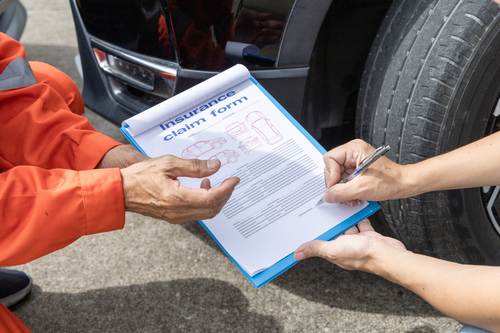After a car accident, one of the first things you need to do is report the incident to your insurance company. But how long do you have to do that? Failing to report on time can ruin your claim and make it harder to get compensated for damages or injuries. Understanding your auto insurance coverage options, such as uninsured motorist (UM) and underinsured motorist (UIM) coverage, and the importance of timely reporting is crucial. Knowing the time limits in your insurance policy and Georgia law is key.
In this post, we’ll cover the deadlines for reporting a car accident to your insurance company, the consequences of delayed reporting, and how an Atlanta car accident attorney can help you through the process to protect your rights and get you more money.
Legal Requirements for Reporting a Car Accident in Georgia
When you’re in a Georgia car accident, you need to know the legal requirements to protect yourself legally and financially.
Reporting to Law Enforcement
In Georgia, state law requires you to report any car accident involving injury, death, or property damage of $500 or more to law enforcement immediately. This is a legal duty regardless of how minor the accident was. The best thing to do is to call 911 and have a law enforcement officer sent to the scene. Failing to do so can lead to serious consequences, including hit-and-run charges.
Giving Information at the Scene
After an accident, Georgia law requires all drivers to stop or return to the scene if necessary. You must also move your vehicle out of traffic if possible. Drivers are required to exchange contact information, insurance information, and driver’s license numbers with the other party. All drivers must render aid to any injured parties, which may include calling for medical help if needed to ensure proper medical care.
Filing a Police Report
If a police officer is at the scene, they will file a report. If not, you must file a report with the nearest law enforcement agency. Failing to report the accident can lead to legal penalties and complicate future insurance claims. This report will be an official record and will be used in any legal proceedings or insurance claims that may arise. Consulting an insurance agent can help you understand the implications of the report on your insurance rates and provide tailored advice based on your circumstances.
Non-Compliance Consequences
Not following Georgia’s requirements for reporting a car accident can lead to serious consequences. Hit-and-run charges can come with fines and even jail time. Not reporting can also weaken your position in insurance and court claims and make it harder to get compensated for damages or injuries.
Insurance Company Deadlines
Reporting to your car insurance company after a car accident promptly is key to getting your claim processed and getting the coverage you’re owed.
Notify Immediately
After everyone is safe and you’ve contacted law enforcement, you need to notify your insurance company as soon as possible. Most insurance companies require prompt reporting, often within 24 hours, to start your claim. Delaying this notification can ruin your ability to get damages and jeopardize your insurance coverage, even if the accident wasn’t your fault.
Consequences of Delayed Reporting
Not filing a car accident claim on time can lead to big problems. Insurance companies can deny claims for late reporting, especially if too much time has passed since the accident. And waiting to report can allow for disputes over liability and damages, making it harder to get fair compensation.
Insurance Policy Requirements
Each insurance company has different requirements for reporting an accident. Georgia law doesn’t have a specific deadline for notifying your insurance company, but most policies have language that says “immediate” or “timely” reporting. To avoid claim denial, the best practice is to report the accident the same day and comply with your policy.
Avoid Informal Agreements
Never settle an accident without involving your insurance company even if the damage seems minor. Hidden injuries and damages can surface later and result in big medical bills or repair costs. By reporting it right away you’re protecting your financial interests and avoiding future disputes with the other driver.
Georgia Statute of Limitations for Filing Claims
Knowing the statute of limitations for filing a personal injury lawsuit after a car accident in Georgia is key to not missing the deadlines and losing your right to get compensated.
Personal Injury Claims
In Georgia, the statute of limitations for a personal injury claim from a car accident is generally 2 years from the date of the accident. This deadline is important—if you don’t file your claim within this time frame you could lose the right to get compensated for your injuries no matter how bad they are. Act fast and protect your rights, especially in car accident injury cases where skilled legal representation can maximize your recovery and navigate negotiations with insurance companies.
Property Damage Claims
For property damage claims like vehicle repairs or personal property replacement Georgia law has a 4 year statute of limitations. While you have more time than for personal injury claims it’s still important to act fast. Delaying your claim can weaken your case as evidence may be harder to get and witnesses may be harder to find.
Special Circumstances
Some cases have shorter or more complex deadlines. For example, if your accident involved a government vehicle the time frame to file your claim is much shorter—6 months for city or county vehicles and 1 year for state vehicles. Accidents involving federal vehicles have a separate administrative process and different timelines including a 2 year administrative claim.
Importance of Timely Action
While Georgia’s statute of limitations gives you 2 or 4 years to file a claim it’s best to act as soon as possible. Filing early increases the chances of getting strong evidence, finding witnesses, and building a good case. Procrastination can weaken your position and reduce the compensation you can get.
What to Do if No Police Report is Filed
If no police officer shows up at the scene of the accident, car accident victims need to take specific steps to document the incident for legal and insurance purposes.
File Your Accident Report
If no police are called to the scene of your car accident, you need to file an accident report with the nearest law enforcement agency. This will create an official record of the incident which is important for insurance claims and future legal proceedings. Be detailed and accurate when documenting the accident including time, location, and condition of both vehicles.
Personal Report of Accident
In addition to filing with law enforcement, you should also create a Personal Report of Accident for your records. This should include weather conditions, actions of all drivers involved, and witness information. Having a personal account can be very helpful later if there are disputes about what happened in the accident.
Documentation
Proper documentation is key when no police report is filed. Without an official police report insurance companies will question if the accident even happened. Keeping detailed records including photos, witness statements, and your Personal Report of Accident can help substantiate your claims and protect you from liability or disputes.
Legal Ramifications
Not filing a report whether with law enforcement or personally can create problems if legal action is needed. Without documentation, you may have trouble proving what happened in the accident which limits your ability to get compensation. Always take proactive steps to document the incident even if police are not involved.
Navigating Insurance Claims
Navigating the insurance claims process for car accident claims can be challenging, but with the right steps and precautions, you can ensure a smoother experience and protect your rights to fair compensation.
Filing the Claim
After you report the accident to your insurance company, the claims process will begin. Be sure to provide accurate information and all necessary documentation including the police report (if available), photos of the accident scene, and any medical or repair bills. This will ensure your claim is processed quickly and you get the compensation you’re entitled to under your policy. In cases involving hit-and-run offenders or uninsured drivers, having uninsured motorist coverage is crucial to ensure you can still receive compensation for damages.
Avoiding Mistakes
When talking to your insurance company, be careful with your words. Don’t admit fault or speculate about what happened in the accident. Stick to the facts. Anything you say can be used against you to reduce or deny your claim. Be honest but remember your insurance company is a business and will look for ways to pay out as little as possible.
Settling Your Claim
If your insurance company offers a settlement, don’t accept the first offer. Often the initial offer may not cover all your damages or injuries. Take your time and review the offer carefully and consider consulting with an attorney to make sure the settlement is fair. An attorney can help you negotiate a higher settlement if needed especially if the insurance company is lowballing your claim.
The Role of an Attorney
You can handle many parts of the claims process yourself but having an attorney by your side can be helpful, especially for more complex cases. An experienced attorney can help you navigate the legal process, deal with insurance adjusters on your behalf, and ensure you get the maximum amount of compensation under your policy. This is especially important if your claim involves serious injuries or disputed liability.
Closing Your Claim
Once you’ve reached an agreement with your insurance company the final step is to make sure all paperwork is completed and payments are made. Stay in touch with your insurance company to confirm all your claims have been processed and any repairs or medical treatment is fully covered. Double-check the final settlement to make sure it covers all your losses and expenses before you close the case.
Consult With an Experienced Atlanta Car Accident Lawyer Today!
If you’ve been involved in a car accident and need guidance on how to report it to your insurance company, don’t wait—time is of the essence. Our team at Atlanta Accident Lawyers is here to help you navigate the claims process, protect your rights, and ensure you receive the compensation you deserve.
Contact us at 864-444-2062 for a free case review today!






